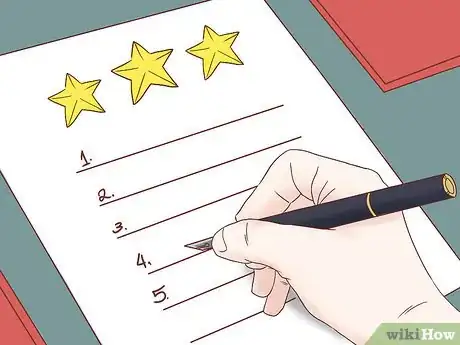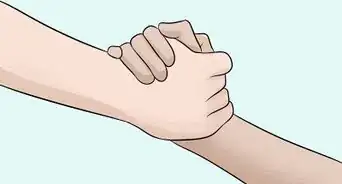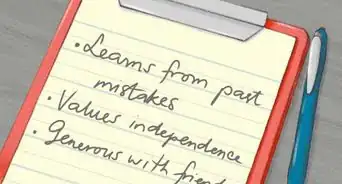This article was co-authored by Michelle Shahbazyan, MS, MA. Michelle Shahbazyan is the Founder of The LA Life Coach, a concierge life, family, and career coaching service based in Los Angeles, California. She has over 10 years of experience with life coaching, consulting, motivational speaking, and matchmaking. She has a BA in Applied Psychology and an MS in Building Construction and Technology Management from Georgia Tech University, and a MA in Psychology with an emphasis on Marriage and Family Therapy from Phillips Graduate University.
This article has been viewed 78,264 times.
Everybody is different. Whether you are a comedian, nerd, great cook, athlete, or love politics, all people have their own niche in life. Finding out who you really are and embracing your uniqueness is a healthy way to live your life. Once you discover yourself, you will find confidence in learning new things, visiting new places, and meeting new friends. Always be proud of who you are and you will have enough self-confidence to deal with all life throws your way.
Steps
Finding Your True Self
-
1Realize what you love. Think deeply about what you love in life and the people who surround you. Although the world might seem like a disaster, we all have people and things that matter to us a great deal.[1]
- Ask yourself, “What do I love absolutely?” Then, make a list of the things that fuel your happiness in life. Add to the list as your life progresses.
- It’s okay to think about the simple things you love like watching television, eating pizza, or taking a drive, but consider those activities that make you excited and feel alive.
- Focusing on the things you love will inspire your heart and soul thereby gaining insight to the things that bring you the most enjoyment.
-
2Acknowledge your accomplishments. Remind yourself about all of times that you were proud, succeeded, or overcame great odds. Then, think about what you did to make those times successful and why you think they are accomplishments. In doing so, you will realize what inner strengths you have.[2]
- What behavior did you exhibit to reach success? Were you calm, cool, and collected, or confident and cocky? Thinking about your behavior will reveal who you truly are.
- How about your actions? Did you take the initiative, collaborate, or discover something different from everybody else? Find out what kind of person you are; a leader, follower, or team-player?
- Did you plan things out or were you spontaneous? What strategies did you employ to be successful?
- By acknowledging your accomplishments and how you achieved them, you will discover your greatest strengths as a person.
Advertisement -
3Discover your purpose. This is probably the toughest thing to discover simply because many of the things we do in life are to avoid judgment or receive favorable judgment. Try the best you can to think about what your purpose is authentically and honestly.[3]
- Start by making a list of everything you would do, say, and go if you never had to worry about what other people would think about it. By connecting these dots, you will be on the path to discovering your innermost wishes, dreams, and your greatest personal values.
- Another way is to take tiny steps towards your purpose by eliminating those things in life that provide obstacles to self-fulfillment while adding things that aid you in the pursuit of your passions.
- Remove the red tape and all the debilitating questions: “what if I fail,” “what if I don’t like it?,” or “what if I make no money?” Instead, take action and try new things. That way, you get out from in front of yourself and pursue your true purpose in life.
- Don’t struggle to find the “one” purpose in life. Rather, live a passionate life to live your life on purpose. Nobody can really claim that they are good at only one thing – good parent, excellent basketball coach, perfect coworker – nor should you claim that you have only one purpose in life.
-
4Live your ideal life. Imagine that no matter what you do, you would be guaranteed success without the threat of failure. Finding the answer will help you discover the life you really desire. Visualize this life and set out to achieve it.[4]
- Ask yourself, “What would I do if I win the lottery for millions of dollars?” This is a good way to fantasize about your life because it would be financially secure. Therefore, you can uncover all the things that you really want to do with your life.
- If you win the lottery, what kind of person would you be; how and where are you living; what is your profession? This is an opportunity for you think limitlessly about your life. By winning the lottery, you remove all the boundaries and obstacles to your dreams and desires and find out what you truly would like to do with your life.
- Answering these inner expectations will help you work towards finding out what would make your life ideal. Indeed, instead of putting the life you desire so far out of reach try to overcome the negative voices that stop you from going from here to your potential dream life.
-
5Find your inspiration. Of all the movie, sports, and musical stars in the world, who inspires you the most? What qualities do they possess that you admire the most? Find the person or people in this world who inspire you and discover why you admire them. You might find that they possess many of the same qualities that you have but were able to go beyond their fears to succeed on a larger stage.[5]
- The person who inspires you the most does not have to be famous. It could also be a friend or family member, teacher, or a colleague. The point is that they accomplished something in their life that you admire and want to emulate. Living authentically is their only choice and it can become yours as well.
- In the end, the greatest knowledge gained is the one where you get a sense of who you really are. Your ability to achieve your internal passions will determine whether you reach your potential or not. If so, you will open many new doors that will enhance the quality and purpose of your life.
Developing Your Talents
-
1Assess your skills. Think about past activities and experiences that you were passionate about and why. Consider your past employment, volunteer activities, or college courses to source your passion and plan for your future job. What special skills were needed to carry out these activities successfully? Skills often align with the things you do well and are interested in.
- By assessing the skills you developed through your deepest personal interests, you can connect them to potential jobs, learning, and leisure activities.
- Self-assessment will help you expand your self-understanding, define your strengths, and clarify which career path is best for you. Your life and work will become more fulfilling as a result.
-
2Identify your strengths. Your strengths are the keys to successfully finding the real you in the workplace. By combining your talent with passionate interests, you will be able to excel at your job and enjoy the everyday challenges.[6]
- A good way to discover your strengths is to watch for signs of excitement. Excitement is a result of performing an activity that you do well and are motivated to do it. Ask a colleague at work to pay particular attention to you for a day to keep track of when they observe you most energized, engaged, and animated.
- There are also several character strength tests on the internet if you feel asking a colleague to observe for an entire day as inappropriate.
- Identify yourself in terms of your strengths rather than by your job title. This will eliminate some boundaries in the workplace and allow you to explore new roles and gain flexibility.
- Recognize your unique approach to utilizing your strengths. Oftentimes, specific skill sets that you thrive at will stand out compared to how other people perform the same task. Take special note of this in order to understand what you are truly good at.
-
3Generate new ideas. Brainstorming is a common technique to generate creative solutions to a problem, or, in this case, to identify how your strengths can be utilized to solve problems. By brainstorming, you can free yourself of stale, established patterns of thought and develop new ways of looking at something creatively. If necessary, bring others into your brainstorming session to help out.
- Although the environment should be relaxing and fun, it should also be focused on creating as many ideas as possible. If you are able to create a long list of ideas to be solved, the better chance you will be able to make new connections to your strengths and skills.
- As you go through the brainstorming process, question everything about yourself. When you analyze your ideas, ask yourself, “do I possess the necessary skills to solve this problem?”
-
4Market yourself. A good way to visualize who you really are is to write a resume. Resumes feature your skills and strengths to a potential employer. By creating a resume, you can look back on past experiences to see what you are good at and how you accomplished the tasks associated with that position.[7]
- By analyzing your education, employment history, and experiences carefully, you can better assess the qualities you have to find employment that can best utilize your unique skill set.
- A resume is built to fit the needs and expectations of the company that you are applying for. This is a good exercise to creatively think about who you are and if you have the skills and experience to deal with issues you will face at the company. By taking this hard look at yourself, you become more aware of who the real you is.
- Writing a resume will give you an opportunity to put into the words what strongly engages your interests, skills, and experiences.
Keeping a Journal
-
1Write about what you don’t want to write about. In this way, you have to write about something that you have a difficult time expressing. This will trick your subconscious to release its “protection” of your feelings and allow the real you to emerge.
- The goal in keeping a journal and writing about difficult topics to find the real is you is to be as brutally honest as possible. Challenge yourself to write about difficult things.
- Being your journal entry with a title such as: “I don’t want to write about…” and complete it with a challenging statement.
- In reality, people often avoid dealing with such topics because it is difficult to solve tough problems and it is easier just to put it off. Not dealing with tough issues, however, does not allow you to find out who you really are.
- By dealing with what you don’t want to write about you will get straight to the point of exactly what you need to work out in your life.
-
2Determine who you are now. Before writing, think about who you were based on your life experiences and then who you are now becoming. What events transformed who you are? What has stayed the same? Periodically checking to find out who you really are is a good exercise to actively evaluate who the real you is.
- An important part of the exercise is to decipher what your core personal values are. By examining what has stayed consistent throughout your life, you will be able to reference back to what is good, beneficial, important, useful, desirable, and constructive to reveal your values. Once your values are determined you are on better ground to decide your priorities in life.
- Once you determine your values, you can begin to ask serious and important questions about what makes you genuinely happy. For example, if you have small children at home, would a career that involves sixty hours a week and travel make you happy?
-
3List your qualities. In your private journal, make a list of your top ten qualities. Private, because you need to be free to make this list without being modest. The important part is that it is quite okay to be the real you. Being positive will affirm how truly wonderful a person you are.
- One way to think about this is, what would a close friend or family say about you if somebody that did not know you asked what you were all about? What qualities would they highlight to best describe you?
- If you are having trouble really finding your true qualities, think of a general quality that describes you like “social.” Come up with more specific qualities that make you social, or how you are social.
- Don’t avoid negative qualities either. Finding flaws will also let you know what you have to overcome to be a better you. Keep in mind that sometimes qualities develop to compensate for flawed qualities.
-
4Remove inner road-blocks. Remove inner road-blocks to achieve clarity through self-reflection. Find the obstacles that are holding you back from becoming the real you. In other words, clear all the distractions out of your head and concentrate on how you can utilize to solve your problems.
- Imagine, for example, what you would ask your 99 year old self: questions such as “what essentials should I be aware of”; “what goals should I focus on”; and “what experiences should I seek out to impact my life”?
- Make sure you ask yourself the right questions. Focus on asking yourself “How can I…” questions because they immediately bring the topic front and center, more solution-based, and empowering. For example, “How can I spend more time with my children?”
- The point of self-reflection is attaining clarity and coming to a solution. By finding a better perspective in dealing with a problem, you can achieve positive change and gain a better understanding of yourself.
- Once you formulate a solution, stick to the power of this new knowledge.
Living Your Life
-
1Live in the present. Let past experiences be a lesson to you while letting future dreams guide you, but live your life in the present. If you want to live an exceptional life you must discover who truly are by not worrying about things that have not happened yet. Concentrating on the here and now will have a positive effect on your emotional well-being.
- Spending too much time thinking about the past or pondering the future limits your ability to move forward at the present time.
- By living in the present moment, you are accepting everything for what it is worth, that things are complete or whole. At this point, you can forgive yourself for mistake and achieve a piece of mind knowing that all things happen for a reason.
- Refuse to engage in fearful thinking about the future. If you worry too much about potential disasters in the future you will get mired in doubt and this thinking will impact what you believe to be your purpose in life is.
-
2Be yourself. Do the things in life that make you happy so that you can continuously engage with life and the world around you. When you know and understand yourself, you know what you want in life and don’t have to hide behind a mask. In this way, you will build a more meaningful life.
- “Self” in this understanding is your unique, individual, and special self who exhibits passions, strengths, and desires that come to life, not the “self” of what others expect of you.
- Relinquish expectations so that you can focus more on yourself rather than on the tasks of a project or conversation. Examine your own expectations and then let them go so that you can be the real you.
- The same goes for conditional relationships. Trying to live up to someone else’s expectations gives you little time to discover what you really want. Expectations will only force you to move further away from your true self.
- By taking care of your “self” and passing up expectations, you will align yourself with your true purpose and meaning of your life.
-
3Stay true to yourself. Take off the mask and stop living lies to please others. Lying to others is, in reality, lying to yourself. Don’t try to live someone else’s dream and get off the path that other expect you to take. Instead, find your own authentic self by expressing the truth and confronting your fears.
- Suppressing your feelings or following a path that is not your own is not living your “authentic self.” For example, keeping your sexual orientation a secret, living in an abusive marriage, or working in an unfulfilling career are all paths that were not chosen. Once those barriers can be overcome, then pursuit of the true self can begin.
- First, admit the truth and, second, express the truth to yourself. If you cannot express the truth verbally, keep a journal for your thoughts and self-reflection.
- Truth is often concealed out of fear, but keeping fear inside without confronting it could create mental, physical, and emotional trauma that will form barriers to discovering the real you.
- Stand up for what you believe in, not what you were taught to believe. Discovering yourself is finding out what you truly believe in.
Expert Q&A
Did you know you can get expert answers for this article?
Unlock expert answers by supporting wikiHow
-
QuestionHow can I be real with myself?
 Michelle Shahbazyan, MS, MAMichelle Shahbazyan is the Founder of The LA Life Coach, a concierge life, family, and career coaching service based in Los Angeles, California. She has over 10 years of experience with life coaching, consulting, motivational speaking, and matchmaking. She has a BA in Applied Psychology and an MS in Building Construction and Technology Management from Georgia Tech University, and a MA in Psychology with an emphasis on Marriage and Family Therapy from Phillips Graduate University.
Michelle Shahbazyan, MS, MAMichelle Shahbazyan is the Founder of The LA Life Coach, a concierge life, family, and career coaching service based in Los Angeles, California. She has over 10 years of experience with life coaching, consulting, motivational speaking, and matchmaking. She has a BA in Applied Psychology and an MS in Building Construction and Technology Management from Georgia Tech University, and a MA in Psychology with an emphasis on Marriage and Family Therapy from Phillips Graduate University.
Life Coach Practice self-care to create a sense of calm and happiness in your mind. Listen to what your mind and body are telling you they need, whether that means taking care of yourself or going out and achieving action-oriented tasks. Remind yourself that all feelings are temporary—they're a result of your mind and body giving you information on what they need so that you can feel better. Talk to someone you trust and respect, and take the time to learn from them and grow with them.
Practice self-care to create a sense of calm and happiness in your mind. Listen to what your mind and body are telling you they need, whether that means taking care of yourself or going out and achieving action-oriented tasks. Remind yourself that all feelings are temporary—they're a result of your mind and body giving you information on what they need so that you can feel better. Talk to someone you trust and respect, and take the time to learn from them and grow with them.
References
- ↑ http://www.mindbodygreen.com/0-5384/6-Questions-to-Help-You-Find-Your-True-Self.html
- ↑ http://www.huffingtonpost.com/shannon-kaiser/3-unexpected-ways-to-find_b_5176511.html
- ↑ http://www.huffingtonpost.com/shannon-kaiser/3-unexpected-ways-to-find_b_5176511.html
- ↑ http://www.mindbodygreen.com/0-5384/6-Questions-to-Help-You-Find-Your-True-Self.html
- ↑ http://www.mindbodygreen.com/0-5384/6-Questions-to-Help-You-Find-Your-True-Self.html
- ↑ http://www.entrepreneur.com/article/224433
- ↑ https://owl.english.purdue.edu/owl/resource/564/01/












































































